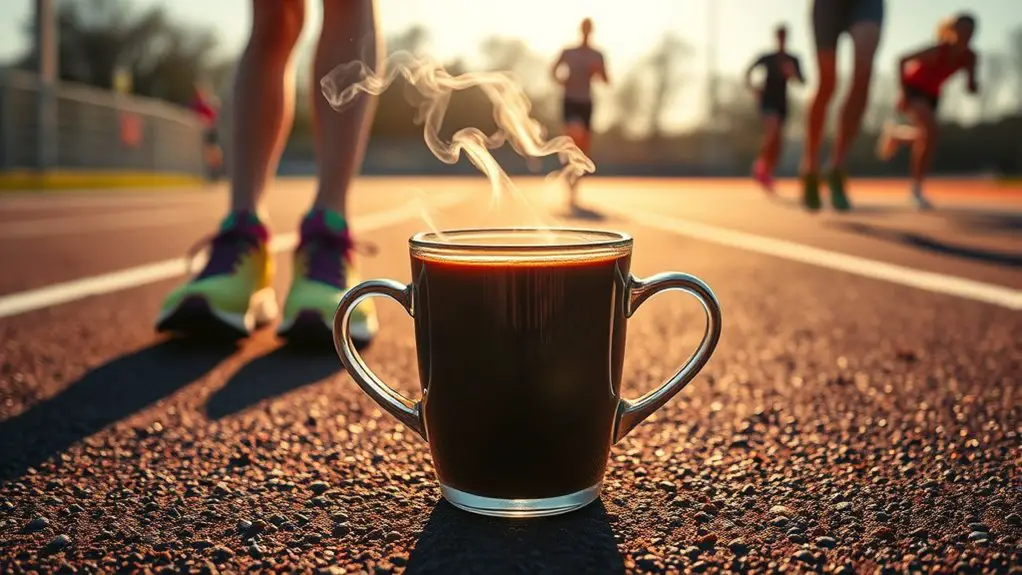Caffeine can boost your athletic performance considerably, enhancing endurance and focus while improving strength and power during workouts. It works by blocking adenosine and increasing adrenaline, giving you that extra edge. However, overconsumption can lead to jitters, increased heart rate, and dehydration if not balanced properly. Finding your ideal dosage is key, and timing your intake makes a difference too. If you're curious about how to strike that balance, there's more to uncover ahead.
The Science of Caffeine: How It Works in the Body
When you consume caffeine, it quickly enters your bloodstream and starts to affect your central nervous system. This stimulant blocks adenosine, a neurotransmitter that promotes relaxation and sleepiness, helping you feel more alert and awake. You might notice an increase in dopamine levels, which can enhance your mood and motivation. Caffeine also stimulates the release of adrenaline, triggering your "fight or flight" response, giving you an energy boost when you need it most. As a result, your heart rate may increase, and blood flow to your muscles may improve, preparing you for action. Understanding these effects can empower you to use caffeine strategically, enhancing your performance while maintaining your independence and control over your body and mind.
Benefits of Caffeine for Endurance Athletes
Caffeine can be a game-changer for endurance athletes, as it enhances performance and helps extend stamina. By increasing adrenaline levels and mobilizing fatty acids, caffeine boosts your energy availability during long workouts or races. You'll likely find that it improves your endurance, allowing you to push through those tough moments when fatigue sets in. It also heightens your focus, sharpening your mental clarity, which is crucial when you're battling those last miles. Plus, caffeine can help reduce perceived effort, making you feel like you can go further and faster. With its ability to enhance both physical and mental performance, embracing caffeine can be a powerful tool to help you reach new personal bests in your endurance journey.
Caffeine's Role in Strength and Power Performance
While many associate caffeine primarily with endurance sports, it also plays a significant role in enhancing strength and power performance. By increasing adrenaline levels, caffeine can help you push through tough lifts and explosive movements. You'll likely find that your overall workout intensity improves, making you feel more powerful and focused.
| Benefit | Strength Performance | Power Performance |
|---|---|---|
| Increased Focus | Yes | Yes |
| Enhanced Power | Yes | Yes |
| Reduced Fatigue | Yes | Yes |
Incorporating caffeine into your routine might just be the key to releasing your potential. Remember, it's not just about running longer; it's about lifting heavier and jumping higher. Embrace the freedom caffeine brings to your workouts!
Optimal Dosage: How Much Caffeine Should You Consume?
Determining the ideal caffeine dosage for enhancing athletic performance can be tricky, especially since individual tolerance levels vary. Generally, research suggests a range of 3 to 6 mg of caffeine per kilogram of body weight for best results. So, if you weigh 70 kg, that's between 210 and 420 mg. It's crucial to find what works best for you, as some folks might feel energized with less, while others may need more to experience the benefits. Start on the lower end and gradually increase if needed. Remember, moderation is key; too much caffeine can lead to jitters and anxiety. Listen to your body and adjust accordingly to release your true athletic potential while enjoying the freedom to perform at your best.
Timing Your Caffeine Intake for Maximum Effect
To maximize the benefits of caffeine for athletic performance, it is essential to time your intake strategically. Consuming caffeine at the right moment can enhance endurance and focus. Aim to take it about 30-60 minutes before your workout for ideal results. Here's a quick reference table to help you plan:
| Timing | Effect |
|---|---|
| 30 minutes before | Peak energy boost |
| 1 hour before | Enhanced endurance |
| 2 hours before | Improved focus and reaction time |
| During workout | Sustained energy |
| Post-workout | Recovery aid |
Experiment with these timings to find what works best for you. With careful planning, you can harness caffeine's power to elevate your performance to new heights.
Individual Variability: How Genetics Affect Caffeine Response
Genetics play an essential role in how each person responds to caffeine, influencing everything from metabolism to sensitivity levels. You might notice that some friends can down multiple cups without a hitch, while others feel jittery after just one sip. This variation stems from genetic differences in enzymes that break down caffeine in the liver. If you're someone who metabolizes caffeine quickly, you may enjoy its energizing effects without much downside. On the flip side, slow metabolizers could find themselves more sensitive to its impacts. Understanding your genetic predisposition can empower you to tailor your caffeine intake to feel its benefits while maintaining your unique sense of freedom and performance in your athletic pursuits.
Potential Side Effects and Risks of Caffeine Consumption
How can something as seemingly harmless as caffeine pose risks for athletes? While it can boost performance, it's important to be aware of potential side effects. Overconsumption may lead to jitters, increased heart rate, or anxiety, which can disrupt your focus and performance. You might also experience digestive issues or insomnia, especially if you down that extra cup too close to your workout. Caffeine can mask fatigue, encouraging you to push harder, but this can lead to overexertion and injury. Additionally, tolerance can build up, diminishing its effectiveness. So, while you might crave that jolt of energy, understanding how caffeine affects you personally will help you maintain your freedom and performance on the field or court.
Caffeine and Hydration: What You Need to Know
While caffeine can enhance athletic performance, it's important to contemplate its impact on hydration. You might think caffeine dehydrates you, but recent research shows it's not that straightforward. Moderate caffeine intake can actually have a neutral effect on hydration levels. However, too much caffeine can lead to increased urination, which may contribute to dehydration during intense workouts.
If you're using caffeine to boost your energy, balance it with adequate fluid intake. Make sure to drink enough water before, during, and after your activities. Pay attention to your body's signals—thirst can be a good indicator. Ultimately, finding your personal balance between caffeine and hydration can help you enjoy the freedom of peak performance without the risk of dehydration.
Comparing Caffeine Sources: Coffee, Supplements, and Energy Drinks
What's the best source of caffeine for your workouts? It really depends on your preferences and goals. Coffee's a classic choice, packed with antioxidants and can boost your mood. Just brew a cup, and you're ready to go. Supplements offer precise doses, making it easy to control how much you're getting. They're convenient and often come in various forms like pills or powders. Then there are energy drinks, which can be tasty but often pack extra sugar and other additives. They might give you that quick energy boost, but watch out for the crash later. Ultimately, it's about finding what fuels your workouts without weighing you down. Explore your options and enjoy the freedom to choose what works best for you!
Making an Informed Decision: To Caffeinate or Not?
Deciding whether to incorporate caffeine into your workout routine can feel overwhelming. You've got to weigh the benefits against potential downsides. Caffeine can boost your energy, enhance endurance, and improve focus, which might give you that extra edge during workouts. However, it can also lead to jitters, increased heart rate, and sleep disturbances if you're not careful.
Think about your personal tolerance and fitness goals. Are you looking for a quick energy boost or consistent performance? Experimenting with different sources, like coffee or supplements, can help you find what works best for you. Remember, it's all about balance. Trust your body, listen to how it responds, and make a choice that aligns with your fitness journey. Your freedom to choose is key!
Frequently Asked Questions
Can Caffeine Improve Mental Focus During Athletic Performance?
Caffeine can definitely enhance your mental focus during athletic performance. It boosts alertness, helps you concentrate better, and may even elevate your mood, allowing you to push through challenges and enjoy your activity more fully.
Does Caffeine Have Any Long-Term Health Effects for Athletes?
Imagine a double-edged sword, shimmering in the light. Caffeine can energize you, but long-term use might bring hidden shadows—like anxiety or heart issues. Balance is key; embrace freedom, but weigh the risks carefully.
Is Caffeine Withdrawal a Concern for Regular Users?
Yes, caffeine withdrawal can definitely be a concern for regular users. You might experience headaches, fatigue, or irritability if you suddenly cut back. It's important to manage your intake to avoid these uncomfortable symptoms.
How Does Caffeine Affect Sleep Quality for Athletes?
Ever wondered how a little boost could impact your rest? Caffeine can disrupt sleep quality, especially if consumed too late. For athletes seeking freedom in performance, balancing energy and recovery is essential for ideal results.
Can Caffeine Interact With Other Supplements or Medications?
Caffeine can interact with various supplements and medications, affecting their efficacy or causing side effects. It's essential you consult a healthcare professional before combining caffeine with other substances to guarantee your safety and performance.




